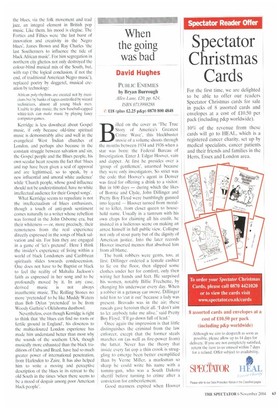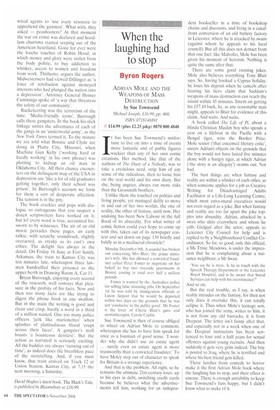When the going was bad
David Hughes
PuBLIC ENEMIES by Bryan Burrough Allen Lane, £20, pp. 624, ISBN 0713998288 (e) £18 (plus £2.25 p&p) 0870 800 4848 Billed on the cover as 'The True Story of America's Greatest Crime Wave', this blockbuster movie of a volume shoots through the months between 1934 and 1936 when a star was born: the Federal Bureau of Investigation. Enter J. Edgar Hoover, vain and dapper. At first he presides over a 'group of gentlemen', unarmed because they were only investigators. So strict was the code that Hoover's agent in Denver was fired for offering a drink to a visitor. But in 600 days — during which the likes of Bonnie and Clyde, John Dillinger and Pretty Boy Floyd were bumhlingly gunned into legend — Hoover turned from moralist to killer, from closet queen to household name. Usually in a tantrum with his own chaps for claiming all his credit, he insisted in a ludicrous scene on making an arrest himself in full public view. Collapse not only of stout party but of the dignity of American justice. Into the later records Hoover inserted memos that absolved him from all blame.
The bank robbers were gents, too, at first. Dillinger ordered a female cashier to lie on the floor, then slipped some clothes under her for comfort, only then wiring her hands and feet. He surprised his women, notably Billie Frechette, by changing his underwear every day. When a robber in a getaway car swore. Dillinger told hint to 'cut it out' because a lady was present. Bravado was in the air; these rascals gave heroism their all. 'I don't aim to let anybody take me alive,' said Pretty Boy Floyd. 'I'll go down full of lead.'
Once again the impression is that little distinguishes the criminal from the law enforcer, except that the former steals marches on (as well as fire-power from) the latter. Never has the theory that inside every fat cop a thin crook is struggling to emerge been better exemplified than by Verne Miller, a marksman so sharp he could write his name with a tommy-gun, who was a South Dakota sheriff before turning to crime after a conviction for embezzlement.
Good manners expired when Hoover wired agents to use every resource to apprehend the gunmen'. What with, they asked — peashooters? At that moment the war on crime was declared and hoodlum charisma started seeping out of the American heartland. Gone for ever were the louche touches of Robin Hood, in which money and glory were stolen from the body politic, to buy addiction to whiskey, access to women and freedom from work. Thitherto. argues the author, Midwesterners had viewed Dillinger as 'a force of retribution against moneyed interests who had plunged the nation into a depression'. Attorney General Homer Cummings spoke of 'a war that threatens the safety of our community'.
Racketeering was the terrorism of the time. 'Media-friendly icons', Burrough calls these gangsters. In the book his slick linkage unites the adventures of each of the gangs in an 'underworld army', as the New York Times termed it. To the minute we are told what Bonnie and Clyde are doing in Platte City, Missouri, when Machine Gun Kelly ('working hard or hardly working' in his own phrase) was plotting to kidnap an oil man in Oklahoma City. All their chance encounters on the delinquent map of the USA in depression are 'like a lot of old graduates getting together, only their school was prison'. In Burrough's account we form for them a sort of desperate affection. The tension is in the pity.
The book crackles and pops with dialogue so outrageous that you suspect a dozen scriptwriters have worked on it, but lo! every word is true, accounted for, sworn to by witnesses. The air of an old movie pervades these pages, an early talkie, with scratchy soundtrack, slightly overacted, as creaky as its cast's own ethics. The delight lies always in the detail. On Friday 16 June at Fort Smith, Arkansas, the train to Kansas City was ten minutes late, whereupon three lawmen handcuffed their prisoner to the upper berth in Drawing Room A, Car II.
Bryan Burrough, enjoying every second of the research, well conveys that pleasure in the probity of his facts. Now and then too many facts are like trying to digest the phone book in one swallow. But in the main the writing is good and clean and crisp, hardly a word in a third of a million wasted. One too many police officers 'jerk like marionettes' when splashes of platitudinous blood 'erupt across their faces'. A gangster's moll boasts 'a bounteous derriere'. But the action as narrated is seriously exciting. All the baddies are always 'running out of time', as indeed does the breathless pace of the storytelling. And, if you must know, that train arrived on Track 12 at Union Station, Kansas City, at 7.15 the next morning, a Saturday.
David Hughes's latest book, The Hack's Tale, is published by Bloomsbury) at 176.99.



























































































































 Previous page
Previous page